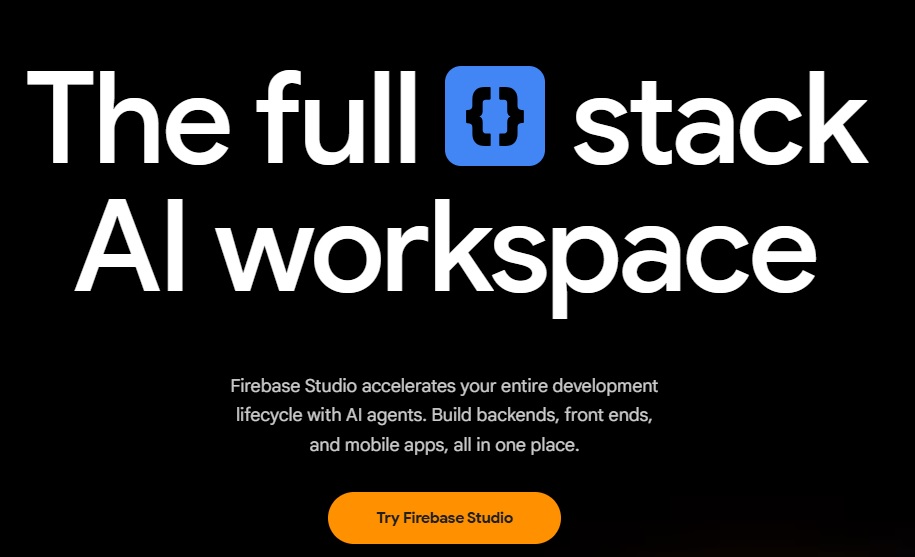Introduction – Why This AI Tool Stands Out
In 2025, Firebase continues to solidify its position as one of the most robust backend-as-a-service (BaaS) and AI-enhanced cloud platforms for developers. Built and maintained by Google, Firebase now integrates advanced AI capabilities through Gemini 2.5 and Firebase Studio, making it easier than ever to build, test, and scale intelligent, data-driven web and mobile applications. What sets Firebase apart is its seamless integration with Google Cloud, AI Logic, and its serverless, developer-first architecture designed for rapid deployment and scalability.
What is Firebase?
Firebase is Google’s integrated platform that provides backend services, real-time data handling, analytics, security, and AI-powered functionality for app development. Originally launched as a real-time database, Firebase has evolved into a complete ecosystem that includes database management, hosting, authentication, cloud storage, and AI-driven tooling.
Its newest addition, Firebase Studio, allows developers to code and configure full-stack applications using natural language prompts powered by Gemini AI. This innovation bridges the gap between coding and conversational development, making it both accessible and highly efficient for professional developers.
Key Features
1. Firebase AI Logic
Firebase AI Logic now supports Gemini Developer API and Imagen models for natural language and image-based operations. Developers can build context-aware features, chatbots, or AI-driven UX elements using integrated model access within the Firebase SDK.
2. Real-Time and Firestore Databases
Both databases provide scalable, low-latency solutions for managing app data. Firestore’s MongoDB compatibility, introduced in 2025, gives greater flexibility for developers migrating from existing NoSQL frameworks.
3. Firebase Hosting
Known for its global CDN, free SSL, and one-command deployment, Firebase Hosting ensures smooth performance and high scalability for modern SPAs and static websites.
4. ML Kit
Firebase’s ML Kit offers built-in AI capabilities such as text recognition, translation, object detection, and image labeling without requiring in-depth machine learning knowledge.
5. Firebase Authentication
Enables robust, multi-provider authentication with email, OAuth, and phone number verification under secure and fully managed infrastructure.
6. Cloud Functions + CI/CD Integration
Firebase supports serverless backend functions with automatic CI/CD pipelines through GitHub Actions, allowing for dynamic updates and stress-free deployments.
User Experience
Firebase’s unified dashboard provides an intuitive UI where developers can manage apps, monitor analytics, deploy code, and optimize experiences in real time. Firebase Studio enhances this with AI-driven code generation, inline prompts, and contextual debugging – transforming project creation into an interactive dialogue with the Gemini model.
Integrations with Android, iOS, Flutter, and web frameworks ensure cross-platform consistency. Additionally, its compatibility with App Check and new visibility tools for data access in 2025 improves control and transparency for compliance-driven projects.
Performance and Results
Firebase continues to deliver benchmark performance when handling scalable, high-traffic apps. Its CDN-backed hosting offers sub-200 ms latency globally, while Firestore’s replication architecture enhances data consistency. For example, developers using Firebase Hosting for SPAs report 40–60% faster load times compared to traditional servers.
Firebase AI Logic benchmarks show up to 35% improvement in user interaction latency when using Gemini Developer APIs for conversational UI compared to 2024’s Vertex-only implementation.
Pricing and Plans
Firebase operates on two main pricing models:
| Plan | Features | Cost |
|---|---|---|
| Spark Plan | Free tier; includes up to 1GB storage, 10GB bandwidth, 10k authentications, unlimited analytics & crash reporting | Free |
| Blaze Plan | Pay-as-you-go for dynamic scaling across databases, hosting, storage, and AI APIs; granular cost tracking | From $5/month, usage-based |
The Spark Plan is ideal for testing and small apps, while Blaze is suited for production workloads that require integration with other Google Cloud services.
Pros and Cons
| Pros | Cons |
|---|---|
| Seamless AI + backend integration | Costs can spike with heavy usage |
| Real-time, scalable databases | Limited relational data structure |
| Cross-platform SDKs | Steeper learning curve for new developers |
| Free SSL, CDN, and CI/CD support | Limited backend customization |
| Excellent documentation and support | High dependency on Google infrastructure |
Best For
Firebase is best suited for:
- Mobile and Web App Developers building scalable apps with real-time data needs.
- AI-Powered Startups leveraging Gemini AI for chat or vision-based applications.
- Enterprises requiring hybrid integration with Google Cloud for analytics and data governance.
- Agile Teams that prioritize CI/CD automation and cross-platform compatibility.
Final Verdict
Firebase stands out in 2025 as a best-in-class BaaS and AI-integrated developer ecosystem. Its combination of productivity, scalability, and intelligent assistance through Gemini 2.5 makes it a top-tier choice for professional developers. While costs and Google dependency remain concerns, the platform’s evolution in AI support, especially through Firebase Studio and AI Logic, redefines how developers build, test, and iterate on their products.
Overall Rating: 9/10 – Outstanding for innovation and technical versatility.
Conclusion – Key Takeaways and Recommendations
Firebase continues to evolve beyond traditional backend services into an AI-augmented development environment. Developers gain unified access to hosting, data, and machine learning within one interface. For teams focused on scalability, real-time synchronization, or AI-rich experiences, Firebase remains a future-proof choice in 2025.



 Facebook
Facebook
 LinkedIn
LinkedIn
 X
X
 Reddit
Reddit